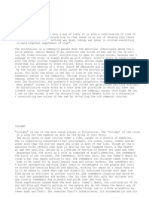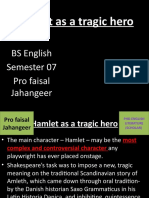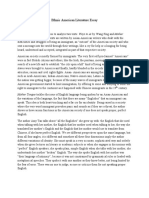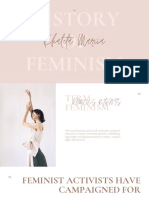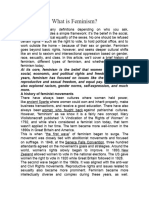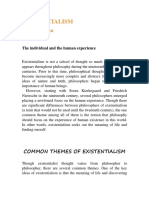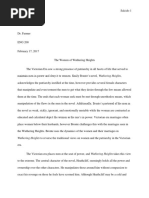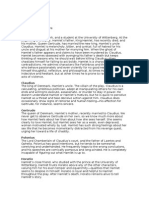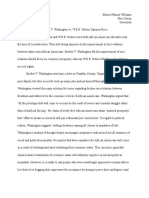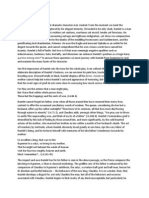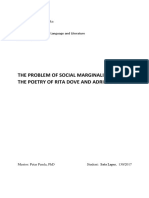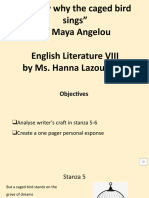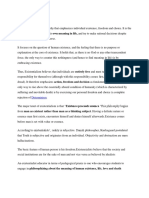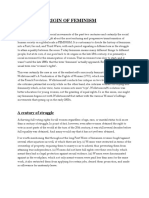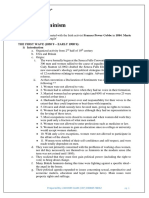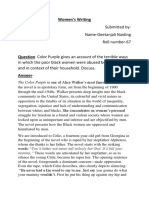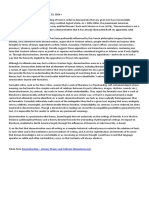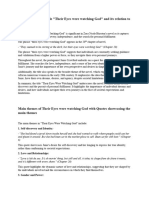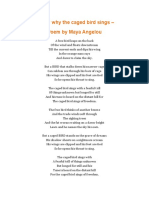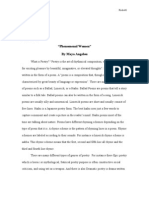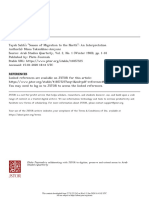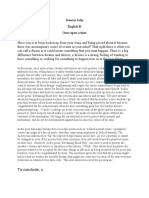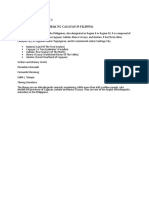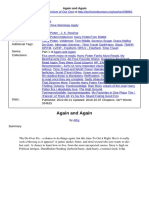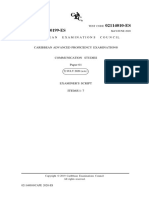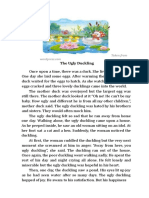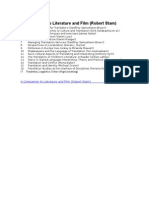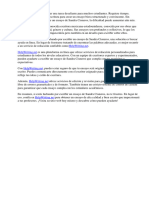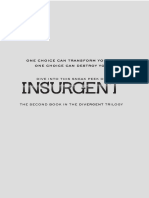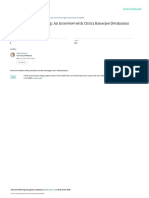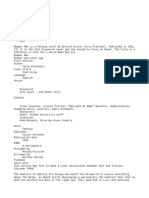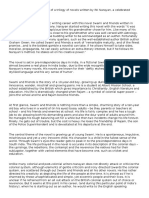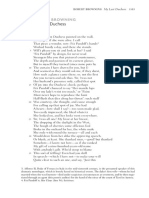0 ratings0% found this document useful (0 votes)
97 viewsCritical Race Reading of Langston Hughes
Critical Race Reading of Langston Hughes
Uploaded by
MERIEM LAMANIThe application of Critical Race theory in reading the poem of "I,Too" by the African-American poet Langston Hughes.
Copyright:
© All Rights Reserved
Available Formats
Download as DOCX, PDF, TXT or read online from Scribd
Critical Race Reading of Langston Hughes
Critical Race Reading of Langston Hughes
Uploaded by
MERIEM LAMANI0 ratings0% found this document useful (0 votes)
97 views5 pagesThe application of Critical Race theory in reading the poem of "I,Too" by the African-American poet Langston Hughes.
Copyright
© © All Rights Reserved
Available Formats
DOCX, PDF, TXT or read online from Scribd
Share this document
Did you find this document useful?
Is this content inappropriate?
The application of Critical Race theory in reading the poem of "I,Too" by the African-American poet Langston Hughes.
Copyright:
© All Rights Reserved
Available Formats
Download as DOCX, PDF, TXT or read online from Scribd
Download as docx, pdf, or txt
0 ratings0% found this document useful (0 votes)
97 views5 pagesCritical Race Reading of Langston Hughes
Critical Race Reading of Langston Hughes
Uploaded by
MERIEM LAMANIThe application of Critical Race theory in reading the poem of "I,Too" by the African-American poet Langston Hughes.
Copyright:
© All Rights Reserved
Available Formats
Download as DOCX, PDF, TXT or read online from Scribd
Download as docx, pdf, or txt
You are on page 1of 5
Critical Race Reading of Langston Hughes's "I, Too"
Meriem LAMANI
Langston Hughes's poem of "I, Too" was published in
1926. James Langston Hughes was born in Joplin, Missouri on
February 1, 1902. He starts writing poems in high schools, after
graduation, he wrote poetry and short plays for children, both
were published in National Association for Advancement of
Colored People (NAACP). He published several fiction about
racism, were widely read by African-Americans. However, "I,
Too" mirrors Hughes's dream of one day Inequality and
segregation will end, and Identity will unified. That time, all,
whites and blacks, will sit around one table. Moreover, the
emphasis on the word "Too" is a response to nineteenth-
Century American poet Walt Whitman's "I Hear America
Singing". The latter rejoices a country that offers him all he
wants, Hughes poem makes clear that America does not offer
the same opportunity and experience for all citizens. However,
Hughes's poem is simple, straightforward structure, and the
plain use of dictions implies the strength and the determination
of the poet. Hughes wrote the poem where being in Genoa,
where he lost all his identification papers. Nevertheless, Hughes
tries to catch a ride to back to America, he was rejected ,
watching white men easily get the ride. He wrote the poem in
attempt to get some money. Nevertheless, the poem's themes of
Identity, Segregation, and Inequality manifest the world that
Hughes saw around him; a world where white sailors refuse to
sere black brother which leaves him without identity or money.
Hughes's poem explores the duality of identity in life of
"Darker brother" (2) in America. The First stanza, consists of
only one line, "I, Too, sing America"(1), it plainly suggests that
even "darker brother" (2) celebrates American identity and
enjoy the opportunity given by America to all its citizens.
However, the emphasis on the word "Too" implies to poet's
reply to another literary work; actually, the poem is a reaction to
Walt Whitman's " I Hear America Singing", which portrays all
the professions even Carpenter and Mason celebration of
American Identity, Hughes responds that even "darker brother"
celebrates America Identity. Hughes, thus, initiates the poem
with singular personal pronoun "I" emphasis of being a subject
in the poem that, too, enjoys America Identity, celebrates
America's greatness, and own the right for dinging America's
opportunities to its citizens which makes him ",Too, […]
America" (18); where he joins his white brothers to celebrate
American Identity. Moreover, Hughes with the final line "I,
Too, Am America" declares that he is, too, present American
Identity and all Americans. In Addition, the poet's use of terms
"black brother", "kitchen", "table", "too" suggests to the duality
if identities in American a hyphen identity, which takes their
rights in public facilities, restaurants, theatres… so forth.
Hughes's poem arguably explores the segregation policy
of America with black people. The second stanza, poet identity
himself as the darker brother who is segregated from his white
brothers. The word " brother" is symbol for all men are brothers
in nature, that all Americans are united, are one segment, one
unity which seek for achieving the American dream. The poet,
however, suggests that not all Americans are given the same
opportunity, experiences, rights, and respect. Those with darker
color are casted aside from these chances, "in the kitchen"(3),
"at the table" (9). " they send me to eat in the kitchen" (3), the
poet said referring to the Jim Crow laws which segregate
citizens of U.S. into segments, white and dark. Nevertheless,
kitchen is symbolically present segregation and lack of
opportunity. All these segregations are manifested in Kitchen.
He, hence, envisions a world clear of segregation, hoping for all
people ,despite the color, sitting around one table. African-
Americans are casted aside to eat in the kitchen; both kitchen
and Table are synecdoche words which implies to segregation in
many places: schools, restaurants, public transportation, public
restrooms; beside living in separated neighborhoods, offering
low-payment jobs. Miscegenation laws made it illegal for a
black person to interaction in any way with white world.
Therefore, Hughes, by saying "eat in the Kitchen" (3), refers to
situation of black colored people in America. The poet describes
the determination of darker brother, not defeated by segregation
law, but they take the advantage of been casted aside to grow
stronger to change the situation in America. The poet, in second
stanza, is hopeful and optimistic of segregation in America, and
determine to change the status quo. He envisions a world,
"Tomorrow/ I'll be at the table" (8-9), where all enjoy the same
rights, the same opportunity, the same experience. He therefore,
clarifies in the last line of poem that all black brothers will enjoy
America. Through the poem, Hughes includes a word full with
hope, and optimism, "Tomorrow" (8). That is, a promise on day
black people will share the same abundance that all Americans
do.
Hughes emphasizes and hopes for Equality between all
Americans. In Stanza four, the narrator reminds the readers of
other reason for giving the darker brothers the equality they
deserve. Hughes does not refer to kind of physical beauty, but to
beauty of soul and beauty of existence that humans embarrass;
there is beauty in life, and in experience of existence. The word
"besides" (15) is additional conjunction refers to the other side
of blackness beauty that white brothers have dismissed;
clarifying the wrong assumptions, the inaccurate perspectives
and judgments of black people. " and be ashamed" (17) the poet
declares that soon the white brother will be ashamed for their
inequality, segregation, preconception, and mistaken judgment
on black people. He, thus, emphasizes and determines earlier,
"No body'll dare/ Say to me/ 'Eat in the kitchen'" (11-13), that
by-and-by they will realize their huge mistakes. Therefore,
Hughes hopes for black people share equality with white people
in future. "Tomorrow" (8), all will sit around the same "table/
When company comes" (9-10). No black brother will willing to
leave the table for the white fellows. Moreover, the poet creates
a fact; when equality become right for all American citizens, the
black brother, too, sing America and become America and
shares his blackness beauty.
Although the poem was written for financial purposes, the
poet's diction is structured out of his heart; portraying life of
African- Americans, and hoping to change this life. The poet
opens the poem with celebration of American Identity as black
person's rights, the right that dismissed. Hughes moves to
introduce himself as a "black brother" (2) to the readers; the
identification is a reference to identify issue in America with
Hyphen identities, to the inequality which segregates white
world from black world. The inequality which sends a darker
brother to eat in the kitchen leaving the table for white people.
But, the poet is not concerned with the segregation, he is
confident enough to laugh, to keep feeding his soul to grow
more stronger in order to make the change the Status Quo of
African- Americans segregation and inequqlity. He is hoping
"Tomorrow" (8) racism in America will be altered, recreated,
renewed. " No body'll dare/ Say to me,/ 'Eat in the kitchen'" (11-
13), no white person will be as strong as he will be to order him
to leave the power, the freedom, the sovereignty, and the table.
Moreover, the white world will identify its mistaken view of
darker brother, they will discover the beauty in darker brother,
not the beauty of physical features, but beauty of existence and
soul that exists in all humans. Then, they will " be ashamed"
(17). But, more, he will sing America, and become America.
The poet argues as strong as he desplays the world which
America has created for her hiphened citizens, referring to the
created laws and the unfair treatement of the black people.
References:
Contantakis, Sara. Poetry for Students, V.30. U.S: GALE
CENGAGE Learning, 2099. Print
You might also like
- Leslie Marmon Silko The Storyteller........Document19 pagesLeslie Marmon Silko The Storyteller........Marselina Govedarica100% (1)
- Hamlet As A Tragic HeroDocument12 pagesHamlet As A Tragic HeroFaisal JahangeerNo ratings yet
- Langston Hughes EssayDocument5 pagesLangston Hughes Essayapi-241237789No ratings yet
- Iranian RevolutionDocument11 pagesIranian RevolutionVasile SoltanNo ratings yet
- Ethnic American Literature EssayDocument4 pagesEthnic American Literature EssayAndrada AndronescuNo ratings yet
- English 3040 Notes Deconstruction HandoutDocument2 pagesEnglish 3040 Notes Deconstruction HandoutMatheus de BritoNo ratings yet
- History of FeminismDocument11 pagesHistory of FeminismMaria KhaletaNo ratings yet
- An Analysis of Shakespeare's The Winter's Tale' Act 3 - Chanelle KatsidziraDocument13 pagesAn Analysis of Shakespeare's The Winter's Tale' Act 3 - Chanelle KatsidziraCocoachanie’s LyricsNo ratings yet
- What Is FeminismDocument5 pagesWhat Is Feminismdanifemarsil30No ratings yet
- ExistentialismDocument5 pagesExistentialismJulius Galarosa100% (2)
- Women in Wuthering HeightsDocument9 pagesWomen in Wuthering Heightsapi-488294271No ratings yet
- William Shakespeare: HamletDocument3 pagesWilliam Shakespeare: HamletPaula BaialardoNo ratings yet
- The Shame of Being An American - by Paul Craig Roberts PDFDocument4 pagesThe Shame of Being An American - by Paul Craig Roberts PDFscribd8885708No ratings yet
- Critical Approaches To Literature (Deconstruction)Document12 pagesCritical Approaches To Literature (Deconstruction)Ranjini Varnasuriya0% (1)
- Revolution of Iran and It's Effect On World Politics Specially On Middle East & Its AftermathsDocument27 pagesRevolution of Iran and It's Effect On World Politics Specially On Middle East & Its AftermathsHassan JalilNo ratings yet
- HAMLETDocument10 pagesHAMLETJenny Ariola CambeNo ratings yet
- DeconstructionDocument2 pagesDeconstructioncultural_mobilityNo ratings yet
- Caged BirdDocument4 pagesCaged BirdJIZ-جيزNo ratings yet
- History of FEMINISMDocument7 pagesHistory of FEMINISMrvsfbwhf82No ratings yet
- Poetry Analysis Paper 3-5-13Document6 pagesPoetry Analysis Paper 3-5-13Emily EvansNo ratings yet
- Booker T Washington Vs WEB Dubois EssayDocument3 pagesBooker T Washington Vs WEB Dubois EssayMarisa Williams100% (1)
- FeminismDocument8 pagesFeminismM.H. MotasimNo ratings yet
- 07 Book Review Israel LobbyDocument17 pages07 Book Review Israel LobbymksayshiNo ratings yet
- مروه سامي حسينDocument6 pagesمروه سامي حسينسحر طالب عوده علوانNo ratings yet
- Introduction To HamletDocument4 pagesIntroduction To HamletCarmen Voicu0% (1)
- The Problem of Social Marginalization in The PoetryDocument17 pagesThe Problem of Social Marginalization in The PoetryStvarno SašaNo ratings yet
- FeminismDocument3 pagesFeminismWaleed KhanNo ratings yet
- Cage BirdDocument12 pagesCage BirdBirds HomeNo ratings yet
- EXISTENSIALISMDocument4 pagesEXISTENSIALISMMercyNo ratings yet
- Origin of FeminismDocument16 pagesOrigin of FeminismMayursikha BordoloiNo ratings yet
- Waves of Feminism: Chapter FourthDocument5 pagesWaves of Feminism: Chapter FourthUsman BaitanaiNo ratings yet
- MethanolDocument1 pageMethanolRiyadi HendraNo ratings yet
- The Color PurpleDocument5 pagesThe Color PurpleGeetanjali Naiding0% (1)
- Narrative Technique/Frame Narrator in Heart of DarknessDocument3 pagesNarrative Technique/Frame Narrator in Heart of DarknessAnonymous mVI6lLNo ratings yet
- Analysis Feminism in The Awakening Novel by Kate ChopinDocument10 pagesAnalysis Feminism in The Awakening Novel by Kate ChopinliteratureNo ratings yet
- Deconstruction Literary TheoryDocument1 pageDeconstruction Literary TheoryMary Joy Dizon BatasNo ratings yet
- Michael Ondaatje's Running in The Family - A Case of Self IdentityDocument5 pagesMichael Ondaatje's Running in The Family - A Case of Self IdentityGlobal Research and Development ServicesNo ratings yet
- To Kill A MockingbirdDocument4 pagesTo Kill A Mockingbirdkate7771594No ratings yet
- Post Structuralism and Deconstruction CriticismDocument15 pagesPost Structuralism and Deconstruction CriticismEmily MazzellaNo ratings yet
- Things Fall ApartDocument7 pagesThings Fall ApartNayana SaranNo ratings yet
- Their Eyes Were Watching God-NotesDocument6 pagesTheir Eyes Were Watching God-NotesThe OutcastNo ratings yet
- Diaspora and Feminism in Chitra BanerjeeDocument16 pagesDiaspora and Feminism in Chitra BanerjeecucúNo ratings yet
- 9057 Solved AssgmntDocument31 pages9057 Solved AssgmntZakir MushtaqNo ratings yet
- Mourning Becomes Electra-Summary, Character, Short, Long PDFDocument50 pagesMourning Becomes Electra-Summary, Character, Short, Long PDFImran AnwarNo ratings yet
- Poemi Know Why The Caged Bird SingsDocument1 pagePoemi Know Why The Caged Bird Singsapi-403718398No ratings yet
- Israel Loyalists Embedded in U.S. Government Pushed U.S. Into Iraq WarDocument109 pagesIsrael Loyalists Embedded in U.S. Government Pushed U.S. Into Iraq WarBursebladesNo ratings yet
- "Phenomenal Women" by Maya Angelou: Rickett1Document7 pages"Phenomenal Women" by Maya Angelou: Rickett1aricket4No ratings yet
- SeasonOfMigration PDFDocument19 pagesSeasonOfMigration PDFDa Hyun YuNo ratings yet
- Jane Austen EssayDocument8 pagesJane Austen Essayapi-252303016No ratings yet
- Davis, AngelaDocument6 pagesDavis, AngelaTika LeinengaNo ratings yet
- Key Terms in PostDocument3 pagesKey Terms in Postنز يهةNo ratings yet
- EBP Smoking CessationDocument9 pagesEBP Smoking CessationAli KayNo ratings yet
- A1 Grammar SummaryDocument16 pagesA1 Grammar SummaryEstevan SaviNo ratings yet
- Feminism HistoryDocument6 pagesFeminism Historycharu kaushikNo ratings yet
- Chapter - II Feminism - An OverviewDocument21 pagesChapter - II Feminism - An OverviewNimshim AwungshiNo ratings yet
- The 1979 Iranian RevolutionDocument7 pagesThe 1979 Iranian RevolutionTim McCullochNo ratings yet
- Arab LiteratureDocument21 pagesArab LiteratureHannah JusilefNo ratings yet
- Monthly Activity Sheet: ZHR/TS/REV2/05112015Document2 pagesMonthly Activity Sheet: ZHR/TS/REV2/05112015Khairul IdhamNo ratings yet
- BannekerDocument2 pagesBannekerapi-306699638No ratings yet
- AnalysisDocument4 pagesAnalysisNikita VillamarNo ratings yet
- Racism and Black AmericaDocument22 pagesRacism and Black AmericaFatima MirzaNo ratings yet
- PhD-book.-Authorship.-p2s1-17-from-The-Madwoman-in-the-Attic Gubar, GilbertDocument12 pagesPhD-book.-Authorship.-p2s1-17-from-The-Madwoman-in-the-Attic Gubar, Gilbertsalome pataridzeNo ratings yet
- Milton 76 MCQDocument20 pagesMilton 76 MCQpraveen kumarNo ratings yet
- Hudhud Chants of The IfugaoDocument2 pagesHudhud Chants of The IfugaoGeorge Ezar N. Quiriado100% (2)
- Poor People: Fyodor DostoevskyDocument24 pagesPoor People: Fyodor DostoevskyFaisal MemonNo ratings yet
- Notes On Summer of The Beautiful White HorseDocument9 pagesNotes On Summer of The Beautiful White HorsePrasad Pillarisetti100% (1)
- The 17th Century: Description of New York (1670), Province of Pennsylvania (1682), and Thomas Ashe's Carolina (1682)Document84 pagesThe 17th Century: Description of New York (1670), Province of Pennsylvania (1682), and Thomas Ashe's Carolina (1682)anon_59951004No ratings yet
- UndefinedDocument2 pagesUndefinedDaneza JohnNo ratings yet
- Literature in R-WPS OfficeDocument3 pagesLiterature in R-WPS OfficeAlih NasilNo ratings yet
- Again and AgainDocument620 pagesAgain and AgainahhhNo ratings yet
- Poetry: Group 2Document15 pagesPoetry: Group 2Julia Clariza CagunotNo ratings yet
- Analysis of War PhotographerDocument2 pagesAnalysis of War PhotographerMenon HariNo ratings yet
- CommStudies 2020 P1 ScriptDocument4 pagesCommStudies 2020 P1 Scriptcodydeonarine9No ratings yet
- SynthesisEssayTemplate 1Document7 pagesSynthesisEssayTemplate 1rosalynashley1826No ratings yet
- The Ugly Duckling: Taken FromDocument21 pagesThe Ugly Duckling: Taken FrombraindaNo ratings yet
- A Companion To Literature and FilmDocument1 pageA Companion To Literature and FilmvarmazyariNo ratings yet
- Ensayo de Sandra CisnerosDocument6 pagesEnsayo de Sandra Cisnerosg696esnz100% (1)
- Term Paper Conclusion ExamplesDocument7 pagesTerm Paper Conclusion Examplesafdtuaerl100% (1)
- Malcolm Muggeridge On Living Through An ApocalypseDocument7 pagesMalcolm Muggeridge On Living Through An Apocalypseivoiceovers100% (2)
- Chapters 1 & 2 From InsurgentDocument26 pagesChapters 1 & 2 From InsurgentEpicReads100% (2)
- The Power of Storytelling: An Interview With Chitra Banerjee DivakaruniDocument18 pagesThe Power of Storytelling: An Interview With Chitra Banerjee DivakarunilafootNo ratings yet
- 11 Reaperman FarmerharvestDocument3 pages11 Reaperman FarmerharvestPaul SavvyNo ratings yet
- Sample Literary AnalysisDocument2 pagesSample Literary AnalysisCharles MontehermosoNo ratings yet
- Swami and Friends Advanced SummaryDocument6 pagesSwami and Friends Advanced Summaryamonescaflowne100% (4)
- AUSTRAC Insights - Assessing ML-TF RiskDocument16 pagesAUSTRAC Insights - Assessing ML-TF RiskWubneh AlemuNo ratings yet
- 17.th CenturyDocument13 pages17.th CenturyhazalkaleeNo ratings yet
- "Strange Meeting" AnalysisDocument5 pages"Strange Meeting" AnalysisMeghan Jennings100% (1)
- My Last Duchess: Robert BrowningDocument2 pagesMy Last Duchess: Robert Browningchetan jewariaNo ratings yet
- The Right Thing To Do NotesDocument8 pagesThe Right Thing To Do NotesSimba001100% (1)
- Music Video PostmodernDocument3 pagesMusic Video Postmodernpopovicanastasia011No ratings yet
